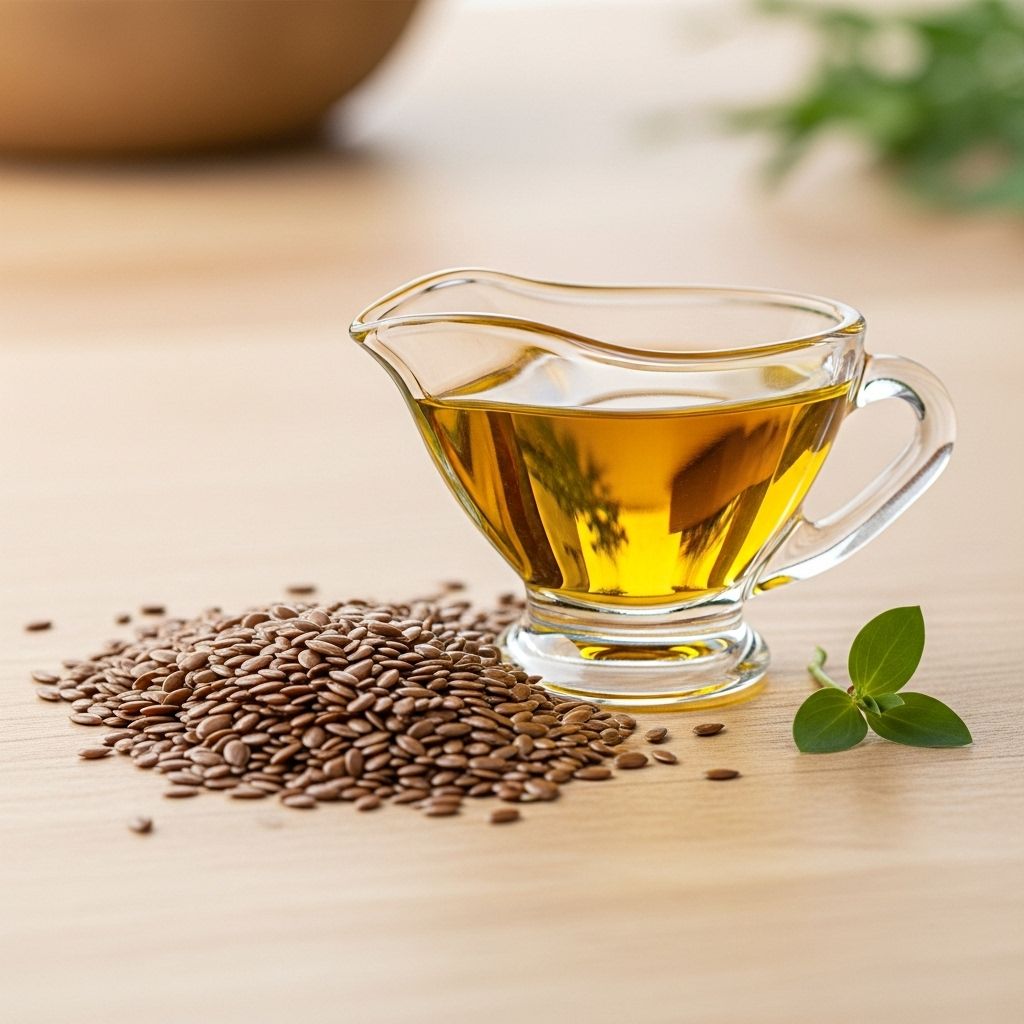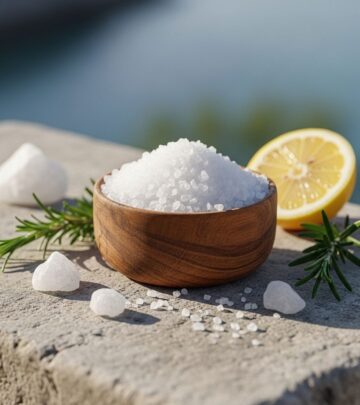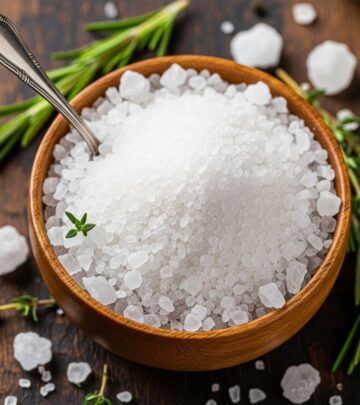Health Benefits of Flaxseeds and Flaxseed Oil: Comprehensive Guide
An omega-3-rich boost that supports heart function, digestion, and hydrated skin.

Flaxseeds and their oil, derived from the versatile Linum usitatissimum plant, have been celebrated for their remarkable nutritional profile and diverse health-promoting effects. Whether you are seeking an omega-3-rich supplement, a plant-based boost for your daily meals, or natural support for skin, digestion, and heart health, flaxseeds and flaxseed oil are proven superfoods worth exploring.
What Are Flaxseeds and Flaxseed Oil?
Flaxseeds are tiny, golden or brown seeds containing a wealth of nutrients—including alpha-linolenic acid (ALA), dietary fiber, and lignans. Flaxseed oil, sometimes called linseed oil, is produced through cold pressing of these seeds, retaining much of the healthy fat content but without fiber. Both forms are available as dietary supplements, additives, or cooking ingredients.
- Flaxseeds: Whole, ground (meal), or sprouted; rich in omega-3, fiber, and plant lignans.
- Flaxseed oil: Liquid or capsules; concentrated source of ALA omega-3 fatty acids.
Flaxseeds and Flaxseed Oil Nutritional Value
The nutritional density of flaxseeds is responsible for many of their acclaimed benefits. Here is an overview of their key nutrients:
- Alpha-linolenic acid (ALA): An essential plant omega-3 fatty acid abundant in both seeds and oil, supporting cardiovascular and brain health.
- Dietary fiber: Soluble and insoluble fibers aid digestion, lower cholesterol, and support satiety (found in whole and ground seeds, not in oil).
- Lignans: Plant polyphenols with hormone-balancing and antioxidant effects (especially high in seeds).
- Protein: Plant-based proteins promoting muscle maintenance and repair.
- Vitamins & Minerals: Notably, vitamin B1, magnesium, phosphorus, copper, and selenium.
One tablespoon of flaxseed oil provides more than the recommended daily intake of ALA for most adults.
13 Amazing Health Benefits of Flaxseeds and Flaxseed Oil
1. Boosts Heart Health
Flaxseeds and their oil are renowned for promoting cardiovascular health. ALA, the dominant omega-3 in flax, can help lower bad LDL cholesterol and may boost good HDL cholesterol. Studies have also shown improvements in blood pressure and arterial function due to the anti-inflammatory effects of ALA .
- Decreases risk of atherosclerosis (arterial plaque buildup).
- May help reduce risk of heart attacks and strokes.
- Provides heart-friendly lignans with antioxidant action.
2. Supports Digestive Health
The high soluble and insoluble fiber in flaxseeds helps maintain gut health, regulate bowel movements, and prevent constipation. Flax acts as a prebiotic, feeding beneficial gut bacteria . Note: Flaxseed oil does not provide fiber but may gently lubricate the digestive tract.
- Natural relief from occasional constipation.
- Supports a healthy gut microbiome.
- Helps stabilize blood sugar levels through fiber-induced slower digestion.
3. May Aid Weight Management
Flaxseeds are filling due to both fiber and protein. These help increase satiety, curb appetite, and may reduce overall calorie intake, contributing to healthy weight control .
- Supports feelings of fullness after meals.
- May indirectly reduce caloric intake and support fat loss in balanced diets.
4. Improves Skin Health
Regular consumption of flaxseed oil can enhance skin hydration and elasticity, and help relieve certain skin conditions such as eczema and dermatitis due to the anti-inflammatory properties of omega-3 ALA .
- Promotes smoother, more hydrated skin.
- May help reduce redness, itching, and irritation in some skin disorders.
5. Supports Hair Health
Omega-3 and natural antioxidants in flax seeds help reduce dryness, flakiness, and strengthen hair from within. Adding flaxseed oil to your routine can promote a healthier scalp and more resilient hair.
- Reduces dandruff and dryness.
- Strengthens hair follicles.
6. May Reduce Cancer Risk
Flaxseeds are one of nature’s richest sources of lignans—phytoestrogens and antioxidants shown in studies to have potential anti-cancer properties. Animal and lab studies suggest that flaxseed oil and seeds may help slow the growth of certain cancer cells, including breast, colon, and prostate cancers. While promising, human studies need further validation .
- Lignans may block certain hormone-sensitive cancer pathways.
- Antioxidant activity supports DNA protection.
7. Promotes Hormonal Balance
Lignans in flaxseeds can exert mild estrogen-like effects, potentially helping regulate menstrual cycles, reduce menopause symptoms, or balance hormone-related conditions.
- May offer mild relief from hot flashes.
- Supports hormonal equilibrium in both sexes.
8. Manages Inflammation
Both the ALA in flaxseed oil and the lignans in flaxseeds possess anti-inflammatory properties that may help manage symptoms of chronic inflammatory diseases (e.g., arthritis, metabolic syndrome) and support recovery from exercise .
- May ease joint pain and swelling.
- Helps counter-act oxidative stress.
9. Supports Brain Function
ALA is essential for healthy brain development and cognitive function. While only a fraction is converted to DHA and EPA (the forms used directly by the brain), flax remains a valuable plant-based omega-3 source, especially for people avoiding fish products .
- May support mood stability and memory.
- Essential for growing children’s brain development.
10. Helps Regulate Blood Sugar
Dietary fiber from flaxseeds can help slow the absorption of sugar into the bloodstream, improving glucose control in people with or at risk of type 2 diabetes .
- Supports balanced energy levels.
- May aid in the prevention of blood sugar spikes after meals.
11. May Improve Blood Pressure
Recent studies indicate that regular consumption of flaxseeds or flaxseed oil can help lower systolic and diastolic blood pressure. This effect appears more likely in hypertensive individuals than in those with healthy blood pressure .
- Supports healthy blood flow and reduced risk for high blood pressure-related complications.
12. Enhances Immune System
The omega-3s, lignans, and fiber all help support healthy immune cell function, keeping your body resilient to pathogens and environmental stressors.
13. Antioxidant Powerhouse
Flaxseeds’ lignans and vitamin E contribute potent antioxidant action, helping defend tissues from free radical damage and supporting healthy aging.
How to Use Flaxseeds and Flaxseed Oil
Integrating flaxseeds and flaxseed oil into your daily diet is easy, and both forms have unique culinary and supplement applications. Here are recommended usage suggestions:
- Whole Flaxseeds: Add to baking, trail mix, yogurt, and smoothies. Best ground for improved nutrient absorption.
- Ground Flax (Flax Meal): Sprinkle on cereal, blend into batters, or stir into oatmeal or salads.
- Flaxseed Oil: Drizzle over roasted vegetables, salad, or add to dips. Not suitable for high-heat cooking as it has a low smoke point.
- Supplements: Flaxseed oil capsules offer a convenient way to boost omega-3s.
Recommended Dosage
- Typical daily dose of ground flaxseed: 1 to 2 tablespoons.
- Flaxseed oil: 1 to 2 teaspoons or as directed by product instructions.
- Drink plenty of water when consuming flaxseeds to avoid digestive discomfort.
Safety, Precautions, and Side Effects
While flaxseeds and flaxseed oil are safe for most people when consumed in moderation, keep these considerations in mind:
- Increase intake gradually to prevent digestive upset.
- People with thyroid disorders should avoid large quantities of raw flax due to potential goitrogenic compounds.
- Flax may interact with certain medications, such as blood thinners—consult your healthcare provider if you are on medication or have chronic health conditions.
- Pregnant women should consult a healthcare professional before supplementing with high doses.
- To prevent rancidity, store flaxseed oil in a cool, dark place and use promptly after opening.
References
- https://www.medicalnewstoday.com/articles/323745
- https://www.healthline.com/nutrition/flaxseed-oil-benefits
- https://health.clevelandclinic.org/flaxseed-oil-benefits
- https://pmc.ncbi.nlm.nih.gov/articles/PMC4152533/
- https://www.mayoclinic.org/drugs-supplements-flaxseed-and-flaxseed-oil/art-20366457
- https://apollodiagnostics.in/blogs/5-health-benefits-of-flax-seeds-123
- https://organicindia.com/products/flaxseed-oil-capsule
- https://www.careinsurance.com/blog/health-insurance-articles/amazing-flaxseed-oil-benefits-you-must-know
Read full bio of Sneha Tete












